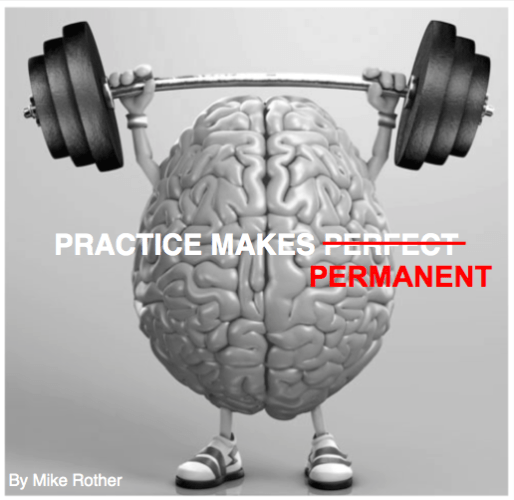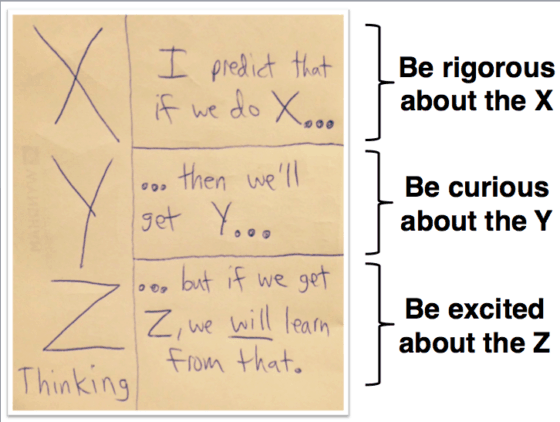Mark's Note: Today's guest post is by my good friend and fellow DFW-area resident Michael Lombard.
Next week, on Tuesday April 19, I'm hosting a KaiNexus webinar where Michael will be presenting on the topic of A Lean Management System Supported By KaiNexus. Register for this free webinar today to attend live or view the recording.
Michael shared this deck with me via SlideShare the other day and he agreed to have me adapt it as a blog post. Thanks to Michael for sharing with us!
Scientific thinking can be powerful
 Practitioners of the Toyota Kata approach, which is based on the research done by Mike Rother, know that scientific thinking can produce huge results for our organizations by helping us tackle those big business challenges that we don't know how to solve.
Practitioners of the Toyota Kata approach, which is based on the research done by Mike Rother, know that scientific thinking can produce huge results for our organizations by helping us tackle those big business challenges that we don't know how to solve.
But there are barriers to developing scientific thinking in our companies
 Just using the terms ‘science' and ‘scientific thinking' themselves can be off-putting to traditional business leaders who may not see how science can have practical business application.
Just using the terms ‘science' and ‘scientific thinking' themselves can be off-putting to traditional business leaders who may not see how science can have practical business application.
“Run an experiment? So, we're going to put on lab coats and play with some Bunsen burners and whatnot? Uh, no thanks.”
– Traditional leaders everywhere

Can we offer business leaders a practical view of scientific thinking?
 Even though medicine is a highly scientific pursuit, the business of healthcare is not typically managed in a more scientific manner than other industries.
Even though medicine is a highly scientific pursuit, the business of healthcare is not typically managed in a more scientific manner than other industries.
 But recently, in a hospital in Huntington, West Virginia, a nurse leader practicing the Improvement Kata was striving to incorporate more of a scientific approach into his team's daily care coordination huddle. After trying to define scientific thinking, he said…
But recently, in a hospital in Huntington, West Virginia, a nurse leader practicing the Improvement Kata was striving to incorporate more of a scientific approach into his team's daily care coordination huddle. After trying to define scientific thinking, he said…
“Well, it's as easy as XYZ.”
The nurse leader came up with this ‘XYZ Thinking' image as a way to simplify the concept of scientific thinking for his clinical staff.
Let's break down the XYZ concept…
Be rigorous with the X

- X indicates the action that we think will produce the result. X is the intervention.
- We want to be rigorous about X, meaning that if in the care coordination huddle we identify the next step as X, then at the follow-up huddle we need to diligently confirm whether X was done or not. This maintains the integrity of the experiment.
- If X is not done as planned, that's an opportunity to do root cause analysis. Was our next step impractical? Are there issues hindering execution?
Be curious about the Y

- Y indicates the result that we think will be produced by the experiment. X + Y = hypothesis.
- We want to be objectively curious about Y, meaning that if at a team huddle we decide to run an experiment, then at the follow-up huddle we should mainly be interested in whether to reject our hypothesis or not. Very cut-and-dry.
- If the result we observe is something other than Y, that's not cause for making excuses, assigning blame, or denying the evidence; instead let's learn!
Be excited about the Z

- Z indicates an unexpected result.
- We want to be excited about Z, meaning that the team should not be deflated about getting an unexpected result. Rather, we should treat this as a highly successful experiment that will lead to valuable learning.
- The focus should be on the learning, and when this is the case, it creates an environment conducive to innovation and striving for big business challenges.
A healthcare example of XYZ Thinking
X: The care coordination team predicted that if the physical therapist rounded (at least enter the room) on the patient every day this week…
Y: …then the patient would be more likely to participate in therapy and meet the care plan goals…
Z: …and the PT did indeed round on the patient every day, but the patient was only able to receive therapy on 2 days.
Typical healthcare issues w/ X
X: Bad example: “Hey, PT, you're going to help the patient meet the care plan goals, right?”
In healthcare, we often fail to establish a clear-cut, verifiable next step, and will only focus on the outcome, thus leaving it to the clinician to be accountable for results. This predictably leads to excuses, blame, & denial (or best-case, a hero mentality).
Typical healthcare issues w/ Y
Y: Bad example: “We can't predict when or if the patient will meet the care plan goals. Every human is different.”
In healthcare, we are often hesitant when it comes to predicting how a patient will respond to treatment, because indeed every human is different. But this is only an issue if we expect the “blame & shame game” when we make a prediction that turns out to be inaccurate. This (justified) hesitancy prevents us from experimenting and learning.
Typical healthcare issues w/ Z
Z: Bad example: “We weren't able to achieve the care plan goals this week. Let's keep trying and stick to the plan!”
In healthcare, we often don't have the time nor inclination to stop and study the situation whenever we get an unexpected result. Plus, if we failed to setup a good experiment w/ a testable hypothesis on the front-end, it's difficult to do much analysis on the back-end. This deprives us of the opportunity to extract maximum learning from each step.
Conclusion
These issues are engrained in the way we think. To overcome them and achieve XYZ Thinking, we must practice new ways of thinking.
What's one way we can incorporate more practice of XYZ Thinking into your team's daily work?


View as a SlideShare:
Please scroll down (or click) to post a comment. Connect with me on LinkedIn.
Let’s work together to build a culture of continuous improvement and psychological safety. If you're a leader looking to create lasting change—not just projects—I help organizations:
- Engage people at all levels in sustainable improvement
- Shift from fear of mistakes to learning from them
- Apply Lean thinking in practical, people-centered ways
Interested in coaching or a keynote talk? Let’s start a conversation.










![When Was the Last Time a Leader Around You Admitted They Were Wrong? [Poll]](https://www.leanblog.org/wp-content/uploads/2025/07/Lean-Blog-Post-Cover-Image-2025-07-01T212509.843-100x75.jpg)
